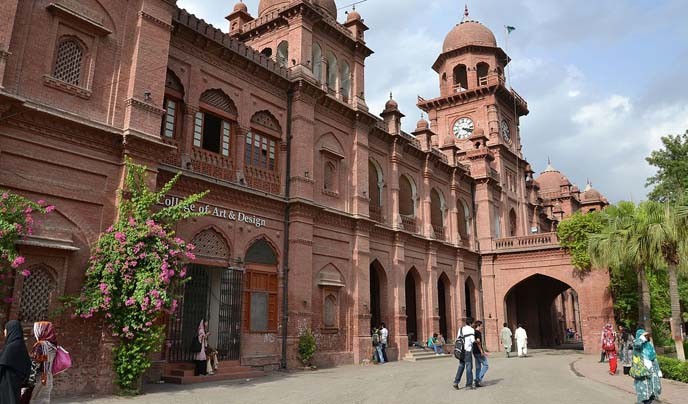
If universities don’t provide for intellectual space, students are vulnerable to exploitation in the name of religion, sects and other ideas for all the wrong reasons

Handling the alleged immortality is one of the non-academic concerns in, perhaps, most of the Pakistani universities. Those at the helm of affairs from faculty and administration believe that they have a moral responsibility to prevent any morally deviant behaviour among students.
In all probability, most of the parents of the university going students share same sentiments with universities across the country. One of these worries is the perception that young boy and girls use campus space as dating spots. The issue becomes acute when official timing of universities ends but some students still stay on campus. One cannot deny the incidents when university students are spotted for making what is called ‘indecent’ acts. Similarly, drug abuse is no less than a very serious issue at campus. There is even an emerging understanding of what is dubbed as a ‘smoking free campus’, a very wise idea indeed.
Additional disquiet is that sensitive and controversial topics should not be discussed in front of students. The so-called sensitive and controversial stuff normally falls within the domains of religion and Pakistan history. The logic behind this is that minds of students are impressionistic. They cannot differentiate between reason and fact, and that they have a superficial understanding, which provokes reaction.
In March, for example, a third-year student at Bahawalpur’s Government Sadiq Egerton College stabbed to death his teacher just because the former believed his teacher was ‘anti-Islam’ and ‘promoting obscenity’. How genuine are these concerns?
We have serious problems with our approach. We always prefer security over liberty. In want of the former, the latter is hugely compromised. In most cases, decision makers, in universities, happen to be in their older age. Most of them tend to pass on the values of their tender age to the youth who are from a different age. Values have never been static. Change in values is an inexorable process. With the passage of time, new values leave older ones redundant. There should be no problem to retain our past values until they are thrust upon the new generations. There is a genuine need to give space to students in terms of values they want to adopt and live with. Of course, liberty is not unbridled.
One’s liberty should not be at the expense of others. Every student should have freedom to any action, which does not infringe upon the same liberty of other fellows. Of course, there cannot be concrete boundary as such to tell where exactly one’s liberty begins and where it ends. Two principles should guide a university’s response to students’ liberty. First, we need to discourage indecent behaviour/obscenity in the public. It is here that somehow one’s liberty infringes upon the liberty of others. Secondly, any act of affection must be consensual.
The very thought of conceiving students as immature is quite problematic. We don’t have any definite benchmark to gauge as to who is mature and who is not. Nevertheless, a certain age, 18 or 21, may serve as a criterion to tell if someone is mature. In most cases, students are already 18 at the time of getting admission in BS programmes across universities in the country.
There is hardly any responsibility without trust. If the faculty, administration and parents fail to repose trust in students, the last mentioned could hardly be expected to act maturely. Before we could expect any responsibility on the part of students, university should seek the opinions of students while formulating guidelines for them. Doing so will give students a sense of ownership and responsibility. They will realise that their say also count. Our universities should function as democratic spaces by taking all stakeholders on board when deciding to frame rules.
The preceding paragraphs should never be interpreted as advocating a libertine life-style but that universities should be least concerned with individual choices that have almost got nothing directly to do with academics. The high-ups of universities should not focus on what they don’t want but what they want: academic excellence.
Universities are worth importance if they serve as the nurseries of new ideas and give space for freedom of expression. There should be no reservation with regards to discussing controversial topics with students. If teachers avoid discussing contentious topics, does this automatically mean students shun pondering upon those controversies in their private life? Of course, students do talk about controversies of almost every kind with their families, peers and friends. In these venues, there is hardly any impartiality and objectivity, the two qualities of an academic environment, which universities are best suited to ensure.
If universities don’t provide for intellectual space, students are vulnerable to exploitation in the name of religion, sects and other ideas for all the wrong reasons. To remedy future dreadful events, teachers should teach art and social science subjects in a way which recognizes the complexities of realities. ‘It is not the gun but man behind the gun that always matters,’ says it all.
Universities should concentrate more on appointing the right persons for the right job. Once the right person is appointed, he/she must be trusted in his/her capacity to act as an expert of subject, unbiased, objective, tolerant and sincere and devoted to the cause of nurturing future nation builders. Universities should be progressive and forward looking. Only then can academia lead societies. Or else, academia will continue to function as merely an appendage to a society.